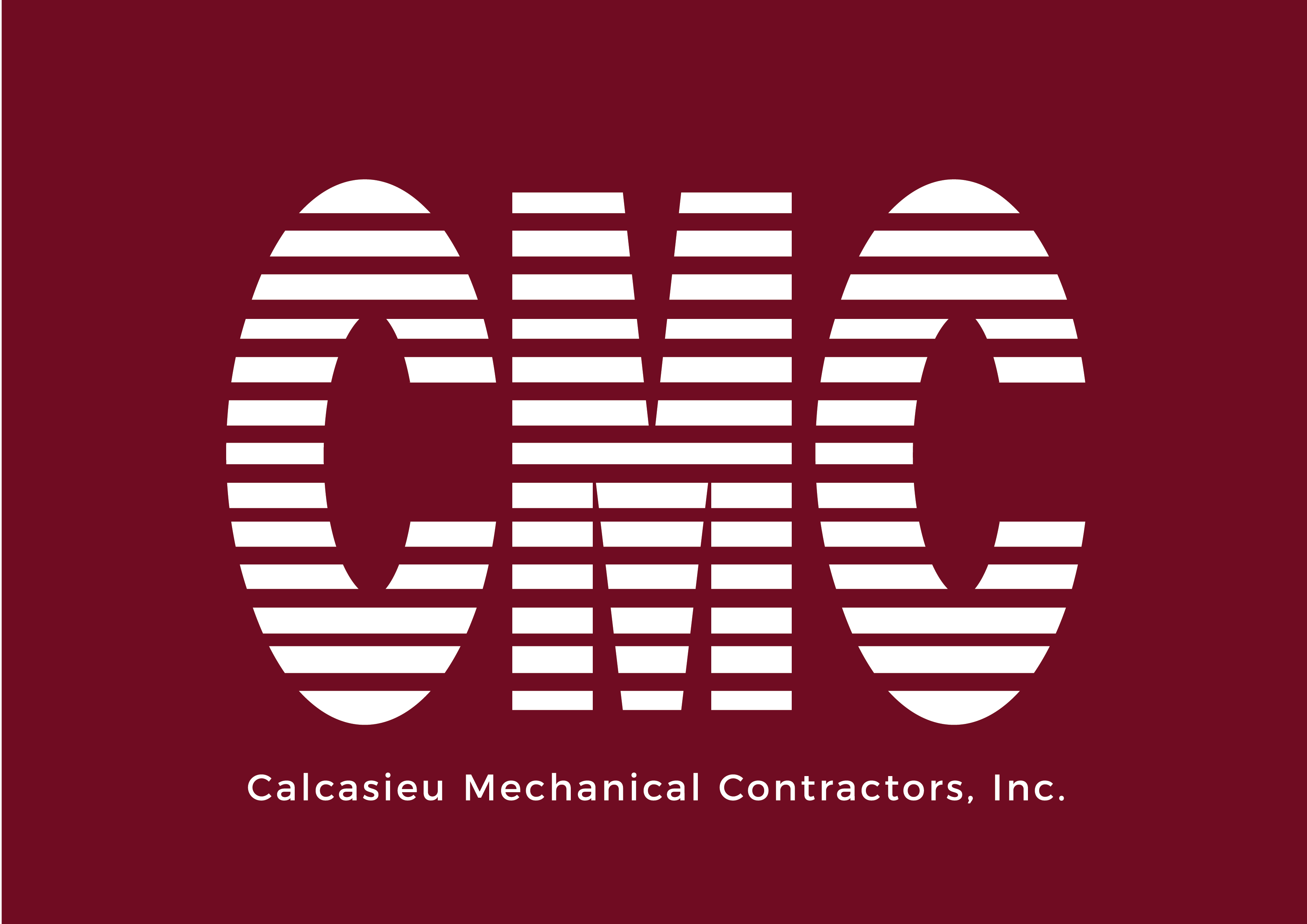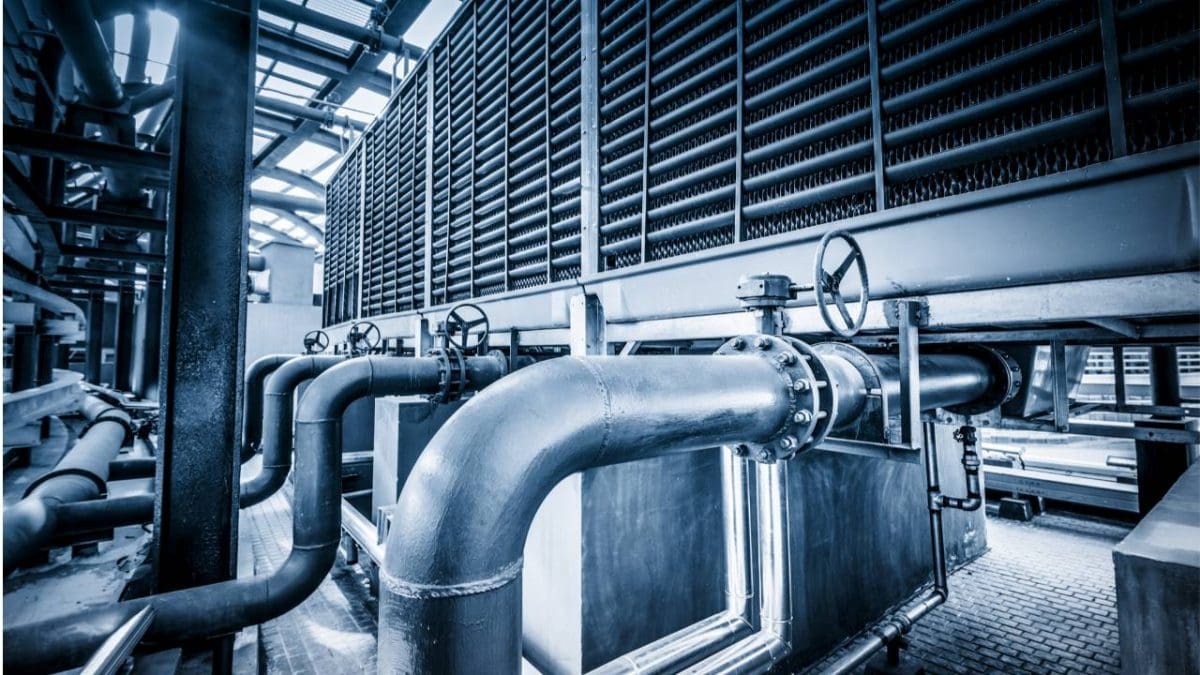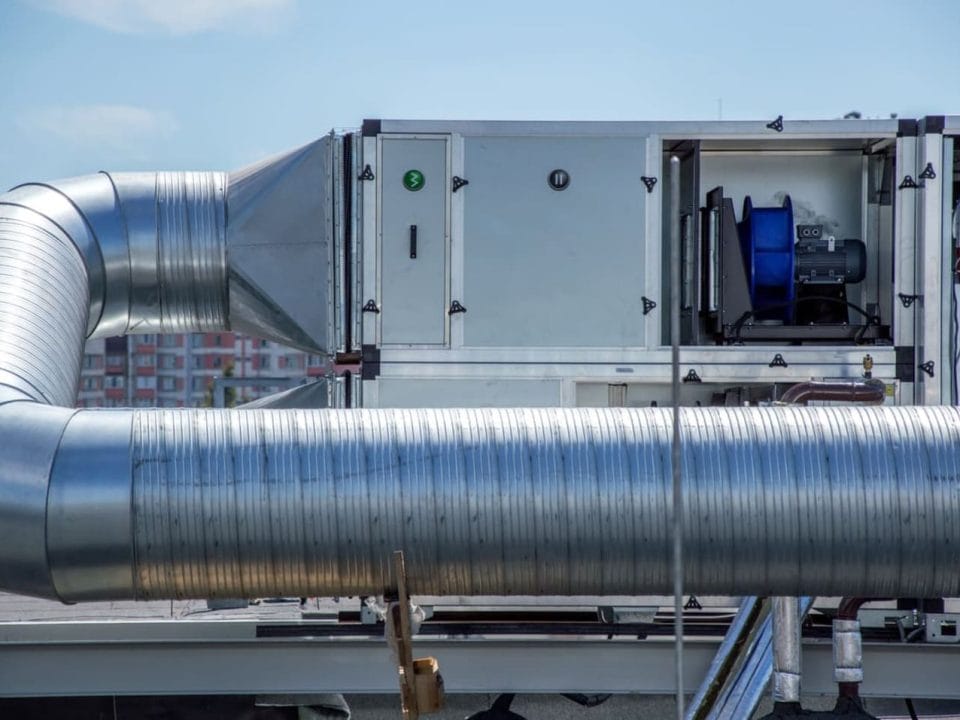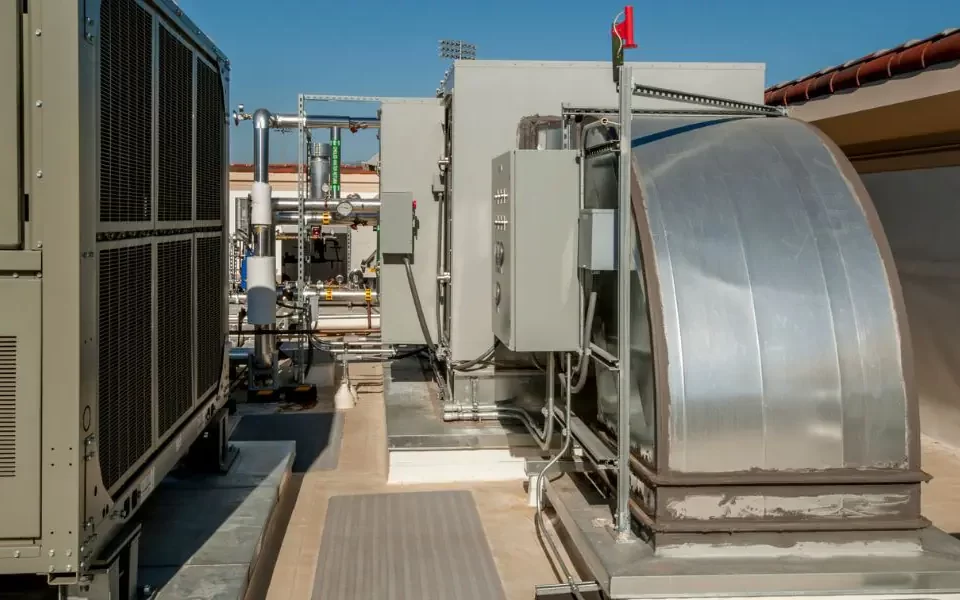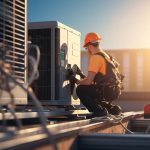
The Importance of Regular HVAC Maintenance for Commercial Buildings
October 1, 2024
Energy-Efficient HVAC Solutions for Military Bases and Complexes
October 15, 2024Choosing the right HVAC system for an industrial facility is a critical decision that impacts operational efficiency and employee comfort. Industrial facilities often have unique requirements due to their size, equipment demands, and specific temperature control needs.
From large-scale manufacturing plants to storage warehouses, each facility requires an HVAC system that can handle high-demand usage, maintain optimal air quality, and operate cost-effectively. In this guide, we’ll explore the key factors to consider when selecting an HVAC system for your industrial facility to ensure that it meets your operational needs and supports your long-term goals.
1. Evaluate the Facility’s Specific Requirements
Before selecting an HVAC system, it’s essential to thoroughly understand and assess the unique needs of your industrial facility. Different types of facilities, such as manufacturing plants, warehouses, and processing centers, have varying HVAC requirements. This understanding will ensure that you are fully prepared to make the best decision for your facility.
- Temperature and Humidity Control: Some facilities, such as food processing plants, require strict temperature and humidity control to meet regulatory standards. Determine the necessary temperature range and humidity levels to choose an HVAC system that can maintain these conditions reliably.
- Ventilation Needs: Facilities that produce dust, fumes, or other airborne contaminants need robust ventilation systems to ensure indoor air quality (IAQ) and meet safety regulations. Identify the specific contaminants present and the level of ventilation required to keep the environment safe and comfortable for workers.
- Zoning and Area-Specific Needs: Large facilities often need different HVAC settings in various zones. For instance, a warehouse area may require a different level of temperature control than a production floor. A system that supports zoning allows for customizable control in each area, optimizing comfort and efficiency.
2. Consider Energy Efficiency and Cost
Industrial HVAC systems consume significant amounts of energy, making efficiency a key consideration in your selection process. Choosing an energy-efficient system not only helps reduce operational costs but also minimizes the facility’s environmental impact.
- Opt for High-Efficiency Models: Look for HVAC units with high Seasonal Energy Efficiency Ratios (SEER) or Energy Efficiency Ratios (EER), as these ratings indicate better energy performance. Investing in a high-efficiency model may have a higher upfront cost but will save money in the long run through lower energy bills.
- Variable Speed Technology: HVAC systems with variable speed technology adjust power output based on demand, providing only as much heating or cooling as needed at any given time. This reduces energy consumption and enhances comfort by maintaining more consistent temperatures.
- Heat Recovery Systems: For facilities with substantial heating and cooling needs, consider heat recovery systems, which capture excess heat from one area (such as the manufacturing floor) and use it to heat other areas. This approach can lead to significant energy savings by recycling energy within the facility.
- Incentives and Rebates: Many energy-efficient HVAC systems are eligible for tax incentives, rebates, or other financial benefits. Check local government programs and utility providers for available incentives, which can help offset the cost of energy-efficient equipment.
3. Choose the Right Type of HVAC System
There are various types of HVAC systems designed to meet different industrial needs. Selecting the right system depends on factors such as the facility’s size, energy demands, and environmental considerations.
- Packaged Rooftop Units (RTUs): Rooftop units are popular for industrial facilities as they save indoor space and offer efficient heating, cooling, and ventilation. RTUs are ideal for large, open spaces like warehouses and distribution centers and can be scaled to meet the size of the facility.
- Split Systems: Split systems, which consist of an indoor unit and an outdoor condenser, are well-suited for facilities with distinct zones requiring different temperatures. These systems offer flexibility in temperature control and can be combined with ductwork to serve larger areas.
- Variable Refrigerant Flow (VRF) Systems: VRF systems provide precise temperature control and are energy-efficient, making them suitable for facilities that require strict climate management. VRF systems are beneficial in facilities with multiple zones, as they can simultaneously heat one area while cooling another.
- Chilled Water Systems: These systems circulate chilled water throughout the facility for cooling and are ideal for extensive facilities with high cooling demands, such as data centers or heavy manufacturing plants. Chilled water systems are efficient and can be integrated with air handlers for large-scale cooling needs.
4. Consider Maintenance Requirements and System Longevity
Industrial HVAC systems are a long-term investment, so it’s crucial to consider the system’s maintenance requirements and expected lifespan. A reliable and easy-to-maintain system will reduce downtime and ensure consistent performance.
- Ease of Maintenance: Some HVAC systems require more frequent or specialized maintenance than others. Choose a system with accessible parts and serviceable components to make it easier for technicians to perform routine maintenance and repairs.
- Availability of Parts and Support: Ensure that replacement parts are readily available for your chosen system. Working with a reputable HVAC provider can ensure ongoing support and access to parts, helping prevent prolonged downtime if repairs are needed.
- Durability and Resilience: Industrial HVAC systems operate under demanding conditions, so selecting a durable system is essential. Look for systems with corrosion-resistant materials and components that can withstand heavy usage and challenging environmental conditions.
- Maintenance Plans and Warranties: Many HVAC providers offer maintenance plans and extended warranties, which can save money on repairs and ensure that your system remains in optimal condition. Consider signing up for a maintenance contract to keep your system in good working order and protect your investment.
5. Prioritize Indoor Air Quality (IAQ) and Safety Features
Indoor air quality is a top priority in industrial facilities, where pollutants, dust, and fumes can accumulate. A high-performance HVAC system can help maintain a safe and healthy environment for workers, improving productivity and reducing health risks.
- High-Efficiency Particulate Air (HEPA) Filters: HEPA filters are designed to capture small particles and improve IAQ. If your facility produces airborne contaminants, choose a system that supports high-grade filtration to remove dust, allergens, and other pollutants.
- Ventilation Controls: Industrial facilities require adequate ventilation to remove stale air, fumes, and contaminants. Look for HVAC systems with advanced ventilation controls to maintain proper airflow and meet OSHA standards.
- Humidity Control: Proper humidity control is essential for both comfort and safety. High humidity can lead to mold growth, while low humidity can cause static electricity and dry conditions that impact equipment and materials. Choose an HVAC system with humidity control to maintain balanced levels.
- CO2 and Air Quality Sensors: Many modern HVAC systems come with air quality sensors that monitor CO2 levels and other pollutants. These sensors help adjust ventilation based on air quality needs, ensuring a safe environment for workers.
Choosing the right HVAC system for an industrial facility requires careful consideration of the facility’s unique needs, energy efficiency goals, and maintenance requirements. Each factor plays a critical role in creating an efficient, safe, cost-effective HVAC solution, from selecting the correct type of system to prioritizing air quality and ensuring ease of maintenance. Investing in a system tailored to your facility’s demands can enhance operational efficiency, provide a comfortable environment for workers, and reduce long-term energy costs. A well-chosen HVAC system isn’t just an expense—it’s an investment in your facility’s productivity and sustainability.
Calcasieu Mechanical Contractors is here to provide expert guidance and customized solutions tailored to your specific industrial needs. Trust our experienced team to help you make informed decisions that enhance your facility’s operations and support long-term success.

Hailing from the picturesque town of Lake Charles, Louisiana, Jim Blanchard stands as an exemplar in commercial HVAC installation and services. As President of Calcasieu Mechanical, he has leveraged his deep industry knowledge and innovative strategies to establish the company as a leading regional service provider. Under Jim’s leadership, Calcasieu Mechanical has expanded its portfolio of high-quality services and earned the trust and respect of businesses throughout Louisiana. The company’s commitment to excellence, reflected in its endeavors, stems from Jim’s dedication to ensuring every project meets and exceeds client expectations.
